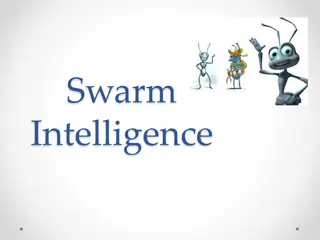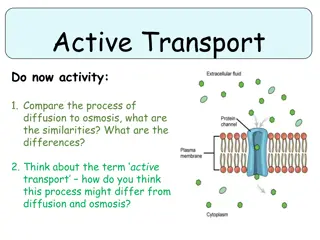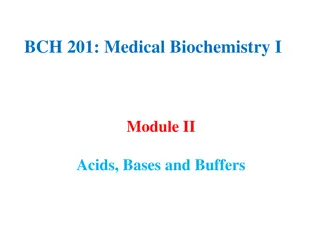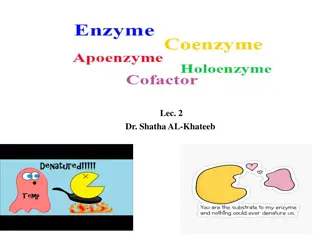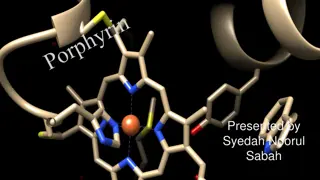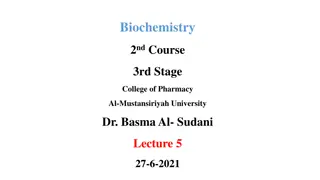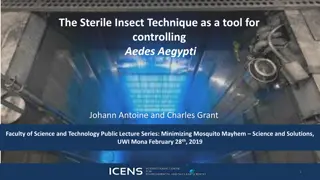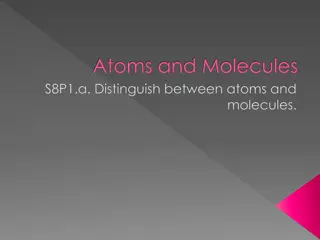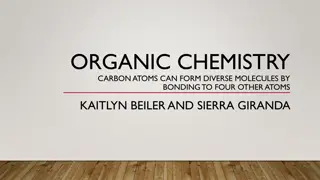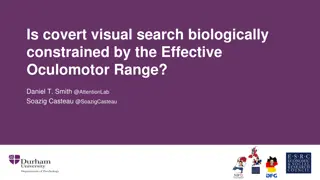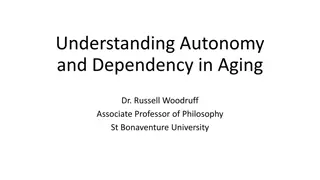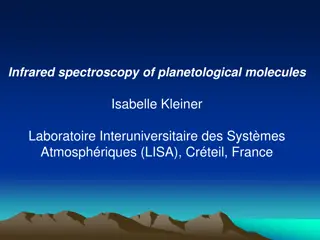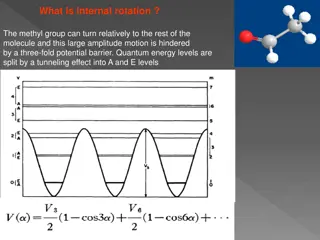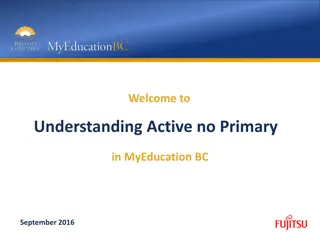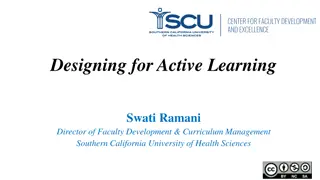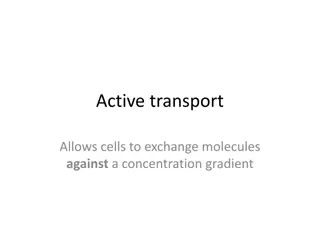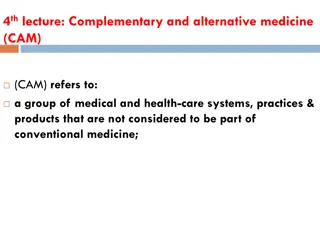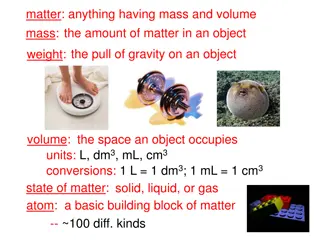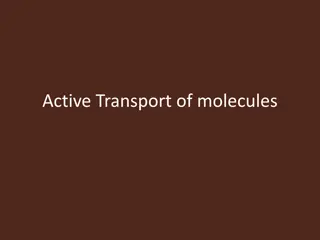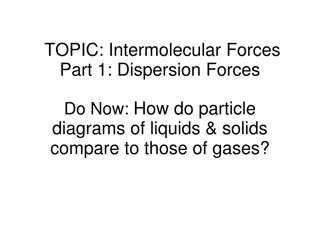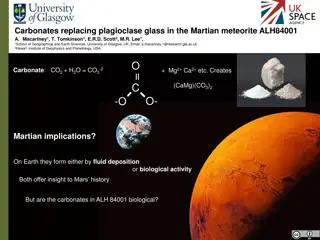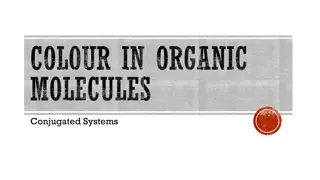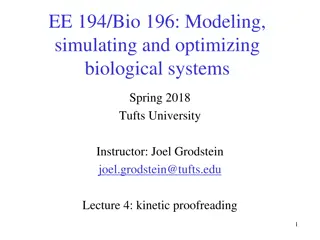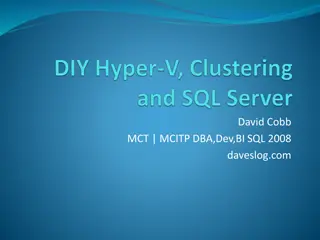Enhancing Professional Learning Through Active Listening Framework
Explore a comprehensive professional learning resource focusing on inclusion, wellbeing, and equalities for Scotland's educators and learners. The resource includes slides on active listening, interconnectivity, and guidance on how to utilize the material effectively. Dive into the National Model fo
11 views • 24 slides
Forever Fit: A Holistic Approach to Active Aging
Embracing an insight-led strategy, Forever Fit focuses on supporting older adults to lead active lifestyles. Collaborating with Everyone Active, their community health and wellbeing programs aim to address health disparities and promote physical activity. By harnessing community insights and fosteri
4 views • 5 slides
Understanding Active and Passive Voice Usage
Learn about the differences between active and passive voice in English grammar, how to convert sentences from active to passive voice, and examples of active and passive voice usage in different tenses. Understand which verbs can be used in passive voice constructions and practice changing sentence
9 views • 7 slides
Houston Active Living Plan Overview
The Houston Active Living Plan is a comprehensive initiative focused on improving the health and quality of life for Houston residents by promoting active lifestyles, access to healthy foods, and tobacco-free environments. The plan addresses key health concerns such as obesity, high blood pressure,
0 views • 14 slides
Understanding Swarm Intelligence: Concepts and Applications
Swarm Intelligence (SI) is an artificial intelligence technique inspired by collective behavior in nature, where decentralized agents interact to achieve goals. Swarms are loosely structured groups of interacting agents that exhibit collective behavior. Examples include ant colonies, flocking birds,
2 views • 88 slides
Understanding Active Transport: Energy-Driven Cellular Processes
Active transport is a vital process in cells that require energy in the form of ATP to move materials across the plasma membrane against their concentration gradient. This process involves pumps, endocytosis, and exocytosis. The sodium-potassium pump in nerve cells is a classic example of active tra
0 views • 9 slides
Understanding Passive and Active Transport in Cells
Explore the processes of diffusion, osmosis, and active transport in cells. Understand the similarities and differences between them, and learn why active transport is crucial for living organisms. Watch a video on active transport and answer related questions to deepen your knowledge. Enhance your
1 views • 12 slides
Understanding Acids, Bases, and Buffers in Medical Biochemistry
Biologically important molecules, such as acids and bases, have significant roles in metabolism. Strong acids like hydrochloric acid ionize completely, while weak acids and bases play crucial regulatory roles. The Bronsted-Lowry theory defines acids as proton donors and bases as proton acceptors. Eq
0 views • 29 slides
Understanding Enzyme Function: The Key Steps and Importance of Cofactors
Enzymes play a crucial role in catalyzing biochemical reactions by forming enzyme-substrate complexes and facilitating changes in substrate molecules to product molecules. The process involves four steps: proximity of enzyme and substrate, binding at the active site, catalysis leading to substrate a
0 views • 39 slides
Understanding Mycoherbicides: Effective Weed Control Using Fungal Pathogens
Mycoherbicides are biologically based agents derived from fungi to control weeds. They are cost-effective, stable, and environmentally friendly. History shows successful experiments in using mycoherbicides to combat invasive plant species. These agents work by releasing phytotoxins that kill target
0 views • 26 slides
Understanding the Importance of Porphyrins in Living Organisms
Porphyrins are essential macrocyclic compounds found in various biologically important molecules, playing a crucial role in the metabolism of living organisms. Derived from the Greek word "Porphura," meaning purple, porphyrins are organic pigments with a distinct porphine macrocycle structure. They
0 views • 20 slides
Understanding Xenobiotic Metabolism for Biomedical Applications
Metabolism of xenobiotics, foreign chemicals like drugs, food additives, and pollutants, is crucial for pharmacology, toxicology, and disease management. Knowledge allows for beneficial applications such as antioxidant research, pollutant conversion, and drug biosynthesis using transgenic organisms.
0 views • 11 slides
Understanding the Main Characteristics of Culture
Culture is a complex social phenomenon that involves shared beliefs, values, norms, and traditions learned and transmitted among members of a society. It is a dynamic and accumulative process shaped through social interactions. Key characteristics include being learned, shared, social, transmitted,
0 views • 13 slides
Utilizing Sterile Insect Technique for Aedes Aegypti Control
The Sterile Insect Technique (SIT) is a biologically-based method used to manage key insect pests by releasing sterile insects to decrease population reproduction. This technique, developed through genetic manipulation and ionizing radiation, has been instrumental in controlling insect populations l
0 views • 13 slides
Understanding Molecules and Chemical Formulae
Explore the world of molecules and molecular formulae, starting from the basic structure of atoms to bonding and predicting chemical formulae. Learn about valency, how atoms bond to form molecules, and how to predict chemical formulas for different elements. Discover the significance of electron con
3 views • 11 slides
Exploring Smells: Molecules and Properties in Chemistry
Dive into the world of molecular structures and smells in chemistry with a focus on distinguishing between molecules with the same formula but different properties. Understand the significance of structural formulas, recognize isomers, and predict the smells of new molecules based on their chemical
2 views • 13 slides
Understanding Atoms and Molecules: Basics and Models
Explore the world of atoms and molecules with a focus on distinguishing between them, understanding atomic structures through historic models like Bohr and Rutherford, and the modern atomic model. Discover how atoms form the basis of all matter and how they are organized within molecules.
0 views • 20 slides
Active Schools Games: Fun Fitness and Sports Challenges Await!
Join the exciting Active Schools Games featuring Starlight Steps to Fitness (Beginner), Starlight Steps to Fitness (Advanced), and Starlight Sports Challenges Game. Roll the dice, complete challenges, earn points, and race to the finish line in these engaging fitness and sports activities. Choose op
0 views • 8 slides
Understanding Pharmaceutical Chemistry: A Comprehensive Overview
Pharmaceutical chemistry delves into the study of drugs, encompassing their development, discovery, synthesis, absorption, metabolism, and more. It involves the design and synthesis of biologically active molecules to create new pharmaceuticals or enhance existing drug structures. Chemistry plays a
0 views • 5 slides
Understanding Organic Chemistry: Carbon Atoms and Molecular Diversity
In organic chemistry, carbon atoms can form diverse molecules by bonding to four other atoms, leading to molecular complexity and diversity. The versatile nature of carbon allows for the formation of various carbon skeletons, contributing to the vast array of organic compounds. Hydrocarbons, consist
0 views • 12 slides
Covert Visual Search and Effective Oculomotor Range Constraints
The study delves into whether covert visual search is biologically limited by the Effective Oculomotor Range (EOMR), exploring neuropsychological evidence, eye movement studies, and participant measurements. It investigates the impact on visual search tasks, including color, orientation, and conjunc
1 views • 15 slides
Understanding Autonomy and Dependency in Aging
This content explores three conceptions of aging - chronological, biological, and psychosocial aging - and their impact on autonomy and dependency in older adults. It discusses how individuals age differently biologically and psychologically and examines the significance of interpreting and respondi
0 views • 20 slides
Insights into Infrared Spectroscopy of Planetary Molecules and Space Exploration
Infrared spectroscopy plays a crucial role in studying planetary molecules like NH3, PH3, and CH3CN, aiding in planetary observations and spacecraft missions. Ground-based observatories and spacecraft like GALILEO and Cassini/Huygens provide valuable data for analyzing planetary spectra and modeling
0 views • 13 slides
Insights into Internal Rotation in Molecules
Internal rotation in molecules, such as the methyl group in acetaldehyde and methyl acetate, involves large amplitude motions hindered by potential barriers. Quantum energy levels split due to tunneling effects, impacting rotational and torsional energy levels. Theoretical models like the Rho Axis M
0 views • 6 slides
Understanding Active vs Primary Status in Education System of British Columbia
In the education system of British Columbia, students classified as Active no Primary are those who are no longer active in their Primary School (School of Record) but are active in a Secondary School. This status affects reporting, tracking, and school record maintenance. Schools and Districts have
0 views • 8 slides
Enhancing Learning Through Active Engagement: Strategies and Insights
Explore the concept of active learning with Swati Ramani, Director of Faculty Development & Curriculum Management at the Southern California University of Health Sciences. Discover the practical applications of active learning, key learning outcomes, and strategies for effective implementation. Dive
1 views • 19 slides
Understanding Active Transport in Cells
Active transport allows cells to move molecules against their concentration gradients by using energy and carrier proteins. This process requires ATP, involves carrier proteins acting as pumps, and is selective in the molecules it transports. The Na+/K+ATPase pump is a key example of active transpor
0 views • 44 slides
Understanding Membrane Transport Processes in Plant Cells
Plant cells are separated from the environment by plasma membranes, which facilitate the movement of molecules through passive and active transport mechanisms. Transport proteins play a crucial role in allowing the movement of ions and polar molecules, with channels, carriers, and pumps enhancing so
0 views • 20 slides
Overview of Complementary and Alternative Medicine (CAM)
Complementary and Alternative Medicine (CAM) encompasses diverse medical practices, products, and systems outside conventional healthcare. CAM includes treatments like acupuncture, herbal remedies, and meditation. Epidemiological data shows widespread usage, particularly for conditions such as back
1 views • 20 slides
Insights from Residents on Active Travel in Doncaster
This report highlights findings from a survey on active travel in Doncaster, covering respondent demographics, levels of active travel, influencing factors, preferred transport methods, perceptions, future plans, and key insights. Key findings include the age groups and employment status of responde
0 views • 35 slides
Understanding Evaporation and Condensation Through Water Molecules
Exploring the water cycle and states of matter, this lesson delves into how ideas about water molecules aid in explaining evaporation and condensation. Through diagrams, simulations, and real-life scenarios, students learn about the movement and changes of water molecules. By comparing their ideas w
0 views • 12 slides
Understanding Matter, Elements, and Molecules
Matter is anything with mass and volume, consisting of atoms. Elements are pure substances with one type of atom. Molecules are groups of bonded atoms. The content explains mass, volume, different forms of elements, allotropes, and compound properties like sodium chloride. It covers chemical symbols
0 views • 37 slides
Understanding Active Transport of Molecules: Driven by ATP Hydrolysis
Active transport, fueled by ATP hydrolysis, facilitates the movement of molecules against their concentration gradients, essential for processes like ion pumping across membranes. The Na+-K+ pump, a prime example, utilizes ATP to transport Na+ and K+ ions across cellular membranes, maintaining impor
0 views • 23 slides
Understanding Agarose Gel Electrophoresis in Biochemistry and Molecular Biology
Agarose gel electrophoresis is a technique used to separate and analyze DNA or RNA molecules based on size in biochemistry and molecular biology. It involves applying an electric field to move molecules through an agarose matrix towards the positive electrode, with larger molecules moving slower tha
0 views • 11 slides
Understanding Intermolecular Forces and Dispersion Forces in Molecules
Particle diagrams of liquids, solids, and gases reflect distinct arrangements due to intermolecular forces. The existence of substances as gases, liquids, or solids at room temperature is attributed to the forces between molecules known as intermolecular forces (IMF), with dispersion forces being th
0 views • 30 slides
Carbonates Replacing Plagioclase Glass in Martian Meteorite ALH84001
The carbonates replacing plagioclase glass in the Martian meteorite ALH84001 have raised questions about their origin - whether they are biologically formed or through other geological processes. Discovered in Antarctica in 1984, this meteorite has been dated to over 4 billion years and initially mi
0 views • 14 slides
Understanding Colour in Organic Molecules through Conjugated Systems
Conjugated systems in organic molecules exhibit alternating single and double bonds, leading to unique molecular orbitals and absorption patterns. With increased conjugation, molecules can absorb visible light, producing vibrant colors like the red from lycopene in tomatoes.
0 views • 28 slides
Biologically Important Evening Element in Promoter Regions: Insights from Research by Leila Shokat
The research explores the significance of the Evening Element as a motif in gene promoter regions regulated by CCA1. Understanding the importance of motif positions in promoters reveals insights into gene regulation and biological relevance. The study highlights the relevance of consistent motif pos
0 views • 6 slides
Understanding Kinetic Proofreading in Biological Systems
Kinetic proofreading is a crucial mechanism by which the body accurately discriminates between closely-related molecules, such as mRNA codons and tRNA molecules in the process of protein synthesis. This process ensures that the correct molecules bind together, preventing errors that could have sever
0 views • 55 slides
Understanding Active/Active SQL Clusters for High Availability
Discover the importance of Active/Active SQL clusters for ensuring 24/7 availability of your database servers. Learn about the benefits, setup process, and the high availability solution it offers for the entire server instance. Follow a detailed step-by-step guide for setting up SQL Active/Active c
0 views • 18 slides




